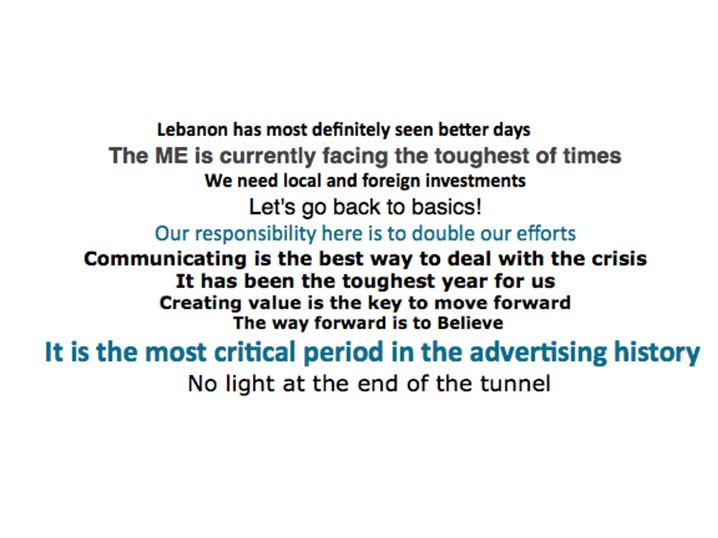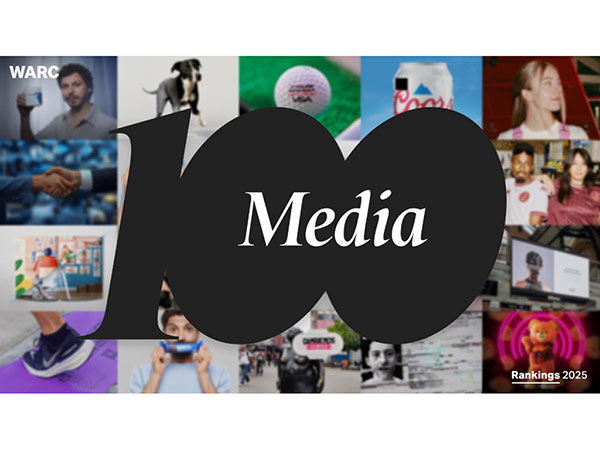News - Advertising
Lebanon Ad Business: A sense of unease and uncertainty
October 30, 2019

Tarek Haddad, Managing Director, J. Walter Thompson Beirut
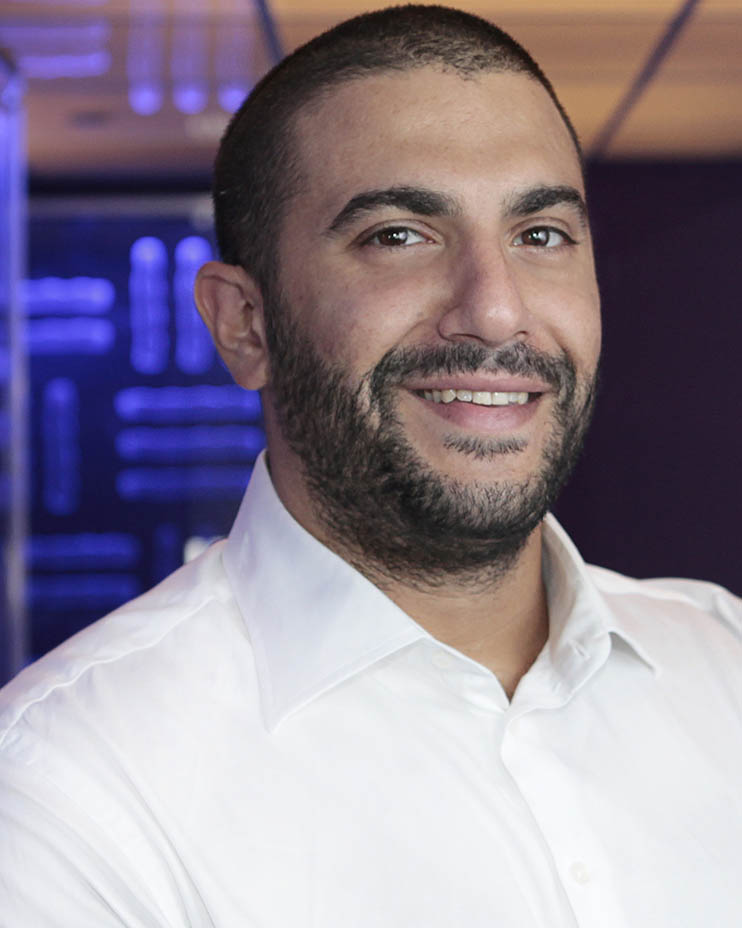
Lebanon has most definitely seen better days. Consumer sentiment with the country is down along with spend dropping across the board and, yes, the first to feel the pinch is the advertising industry. But why is this continuously the case during tough times? It’s during the toughest of times that advertisers can truly make a noticeable difference to clients’ bottom-lines. However, frustration lies with the fact that the advertising discipline is more-often than not brought to the table at too late-a-stage, almost as an after-thought. Advertisers are problem-solvers, we live for solutions that will grow brands and drive sales, as we know our audience and their behaviors better than anyone else – just look at all the volume of consumer reports and brands we have helped sell. Bringing advertisers to the table early on with clear marketing budgets and clear performance indicators will more often than not result in a positive outcome, and if not, the ability and area to optimize in is clearer. Too much time is spent with too many cooks deciding on what to tell consumers versus a stronger understanding of the consumer buying cycle, within the brand-scape, and selling not telling!
Waddah Sadek, CEO Its Communications
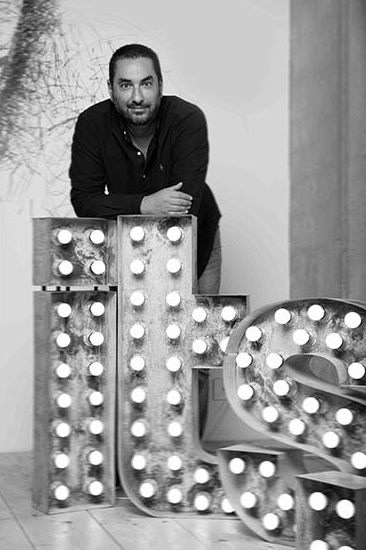
The economy is suffering in Lebanon, and definitely affecting the ad business, as we consider ourselves in the first line of defense receiving the main damage of the economy drop. The most urgent need is to try to legalize the syndicate and introduce whatever rules that are needed to protect the agencies, including the agencies/media relationships.
Diego De Aristegui, Planning Director, Interesting Times

There is a parallelism to be drawn between the general business atmosphere in Lebanon and the ad industry in particular. Both do not seem to have planned or evolved with the socio-economic times. The business environment in Lebanon is still run by most of the same oligopolies who experience success and growth at a time before digital disruptions. In parallel, most agencies that operate in the Lebanese market also now face the challenge of transforming and adapting to the many disruptions affecting business across the globe.
The most urgent need for clients and agencies is to understand how to create value that can experience sustainable growth in a new, digital economy. At the moment, actions are mainly reactive in nature. Trying to put out smaller fires is not really fixing the problem at its core. Investing in training, creating value for employees and not only shareholders, modernizing and digitizing their offering, being socially and environmentally conscious are the first steps in the right directions. Clearly, this is to be paired with an improved macro-economic and fiscal environment. Creating value, over and above a healthy bottom-line, is the key to move forward today.
Georges Slim, CEO, Pimo
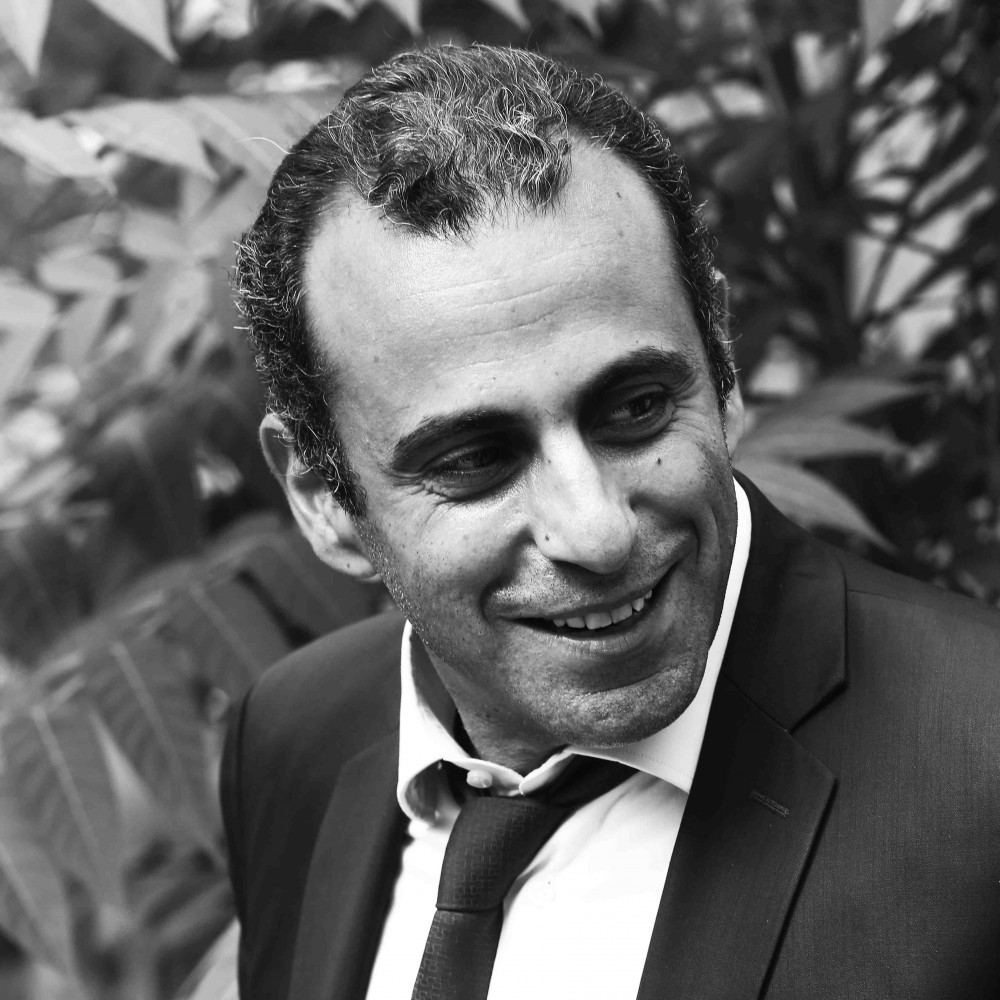
With the every ending deadlock political and economic situation in Lebanon, every year brings us a new challenge! It has been the toughest year for us here and the region, and unless a miracle happens, 2020 will witness a significant transformation.
The environment is tough, there’s no doubt about that and the changes we’re facing are happening on all fronts at once.
The challenges we are facing are nothing new to the world: whenever an economic crisis arises, communication budgets are cut. And there will always be, in Lebanon like everywhere else, businesses and brands that can see and take the opportunity of those turbulent times to stand out, connect with their audience, and build bonds that are meant to last.
Marketers and agencies will need to look for more meaningful and personal communication tools to reach their consumers… The trend is how about to bring the brand into their daily lives, and not the other way around, it’s all about evolving the way we communicate to them.
Alain Shoucair, CEO and Creative Director Bluetrain

There’s no shortage of economic analysis available in the media and it’s all depressing. As far as advertising goes, the state of the business is entirely predictable. In any economic downturn the advertising budget is the first thing to be cut. And it’s wrong. It never fails to amaze me that business thinks advertising is something that it can live without while maintaining its position in the market. Too many fail to understand that their marketing budget isn’t a ‘cost’; it’s an ‘investment’. If you stop interacting with people they forget you’re there.
Fadi Mroué, CEO/CD, République

The situation in Lebanon is nothing new, for years businesses have struggled – the only difference is now it seems there’s no light at the end of the tunnel. At République we’ve tried to build our model around this situation. We cater our services to international clients, not just in the Gulf but the US and Europe as well, amounting to over 60% of our income. We also invested in building our own products that bring in non-service related revenue, and in Lebanon we offer turn-key solutions of Creative, in-House Film Production + Web, which makes more financial sense to our clients. This strategy has seen our agency grow rather than shrink in these tough times as we’ve diversified our offering and reduced the risk of being too reliant on one revenue stream.
Sara Assaf-Managing Director, Y&R Beirut

Advertising is going through very rough times. Lebanon is going through very rough times as well. Put the two together to get a grim outlook on the difficulties our ad industry is currently facing. Consumer purchasing power is on the down. Client costs are rising and their revenues are decreasing, due to both the financial and economic crisis. This is resulting in budget cuts and reluctance to spend. What is also utterly frustrating is we can’t foresee an improvement of this context in the near future, because there is no competent policy-making to address the recession our country is facing. I believe the most urgent need today is to lobby and pressure the government to come up with the proper reforms and policies needed to regain investors trust, and convince the International Community to help Lebanon grow again.
Ramzi Barakat, Founder / creative director B & welovebrand

After Cannes this year, it is somehow clear that Lebanon is off the map lately when creative work is concerned. So, it is frustrating for a country that is so creative and boiling with talent not to be able to shine in the advertising industry. We all know the reasons why, one main reason being the economy and work that is mainly behaving in the same manner that is … rushed, lacking planning, dedicated to quick wins ( promotional ) and completely frightened and sporadic. It is very strange, whereas we all in Lebanon know, clients and agencies, the importance and the value of creativity when it comes to business. So that is a frustrating situation.
The way forward is to Believe. Believe in the added value of creative ideas. Ask for it, and never settle. One of my favorite campaigns this year is the monoprix “ speaking packs " idea and if you read about the results they are quite astonishing. We had presented a very similar idea to a client in Beirut who told us “great work” now that would work in France but not here. Not true. We discussed for an hour, and we were simply tired explaining and tired pressing for it and finally were subdued. Why does it have to be so hard ? Now you help us answer this question. Why do you ask for a creative agency in the first place ? Could you answer that too ? Thanks.
Ghada Chehaibar, Managing and Creative Director, Purple advertising

We are undoubtedly going through a critical period; it’s a global economic crisis where the whole region is affected, and of course, Lebanon first. As we all know it too well, advertising reflects the image of the country and is closely related to the general financial atmosphere. To know how advanced and civilized a country is, we can clearly measure it through its cultural level, its progress but also through its advertising level of investments and creativity. It's a difficult period to overcome, we are trying to find intelligent solutions and think in the right direction with the right strategies in order to resist and overcome this crisis, while hoping for better days to come.
It’s quite obvious that clients are reducing their budgets, that the supply is higher than the demand, on top of a major fall in the purchasing power. Several factors describe the current state of the market, while we are all aware that a product on the market without awareness campaign and promotion fades into oblivion unless it has very solid roots previously established.
The urgency and the challenge is to adapt to the situation, to ensure that each dollar spent is effective and in the interest of the client and the agency. It’s about measuring the best effectiveness of the action plan, while a answering the expectations and evolutions of consumer values, finding messages that are friendly and close, turning negative rumors into positive messages, giving impetus and encouraging the consumer not to let go, all that while being transparent and direct!
In conclusion, Communicating is the best way to deal with the crisis.
Sami Saab, Founder / Creative Director, Phenomena

It is the most critical period in the advertising history.
The market in the whole region is witnessing the hardest time specially in Lebanon.
The Communication sector is currently damaged by our economic situation and unfortunately it's become a daily challenge.
We are trying to face and surpass the political and economical status-quo, as we struggle on daily basis when it comes to money collection and cash flow, which are both imperatives to maintain a viable system.
It is only through trials and errors that we are adapting while reverting to a myriad of alternatives and solutions needed to survive and maintain our success.
We have a responsibility here and it is to double our efforts, keep our spirit high so the energy of our creativity remains at its best in order to keep the magic of this field ongoing and to rebel against the stagnant state.
Aline Baddour, General Manager, Horizon FCB

For the past months, all we hear in business meetings, gatherings with friends or simple discussions are questions such as “Is the Lebanese economy crumbling?”,“Will it collapse?”,“Is the Lira in danger?” and more of likewise frustrating yet realistic thoughts…
Where does advertising stand within such an alarming situation?
Well, it is no different than any other industry: budget cut downs, stagnation, and agencies that are disappearing from the local market one after the other.
To make change happen and see the Lebanese economy boom again in all its sectors including advertising, we need local and foreign investments. But first, the trust of regional and international institutions and potential investors should be regained.
In the meantime, all we – advertising agencies – can do, is keep up with international trends and smart approaches to the business, by offering our knowledge and know-how to our clients and coming up with creative and cost efficient solutions in order to help them enlarge their businesses and profits, rebuilding success stories together.
Joe Ayache, IAA Lebanon Chapter President

Today in Lebanon we have a dominant monetary policy that is seeking to defend the Lebanese pound with very high interest rates, and we do not have an economic policy that seeks to trigger investments. As a matter of fact, these policies are in conflict. Subsequently all the business sectors are suffering from the general state of the economy, the large market of real estate came to a halt, the car market is witnessing a 23% drop in sales versus same period last year, while other retail businesses are downsizing or laying off personnel.
By the same token the advertising business is shrinking, where budget cuts are common and reshuffling of priorities becomes more and more frequent. Even agencies were not spared these pressures and many of them are tightening their belts. The multinationals have a very strict cost control and these agencies have a compliance regimen that they should adhere to.
But it is in dire times that resourceful management is mostly needed and where leadership qualities can shine. These difficult times are unfortunately for the short-term solutions, and most clients want quick shelf offtake, and discounted cars sold, and reduced prices of products and services bought. Therefore, the tactics used should take into consideration these factors and act accordingly. Agencies also have to make do with shrinking margins, they need to do more for less income.
The paradigm today is CHEAP – FAST – GOOD How can agencies cope with this equation remains to be seen, but the challenge is open.


